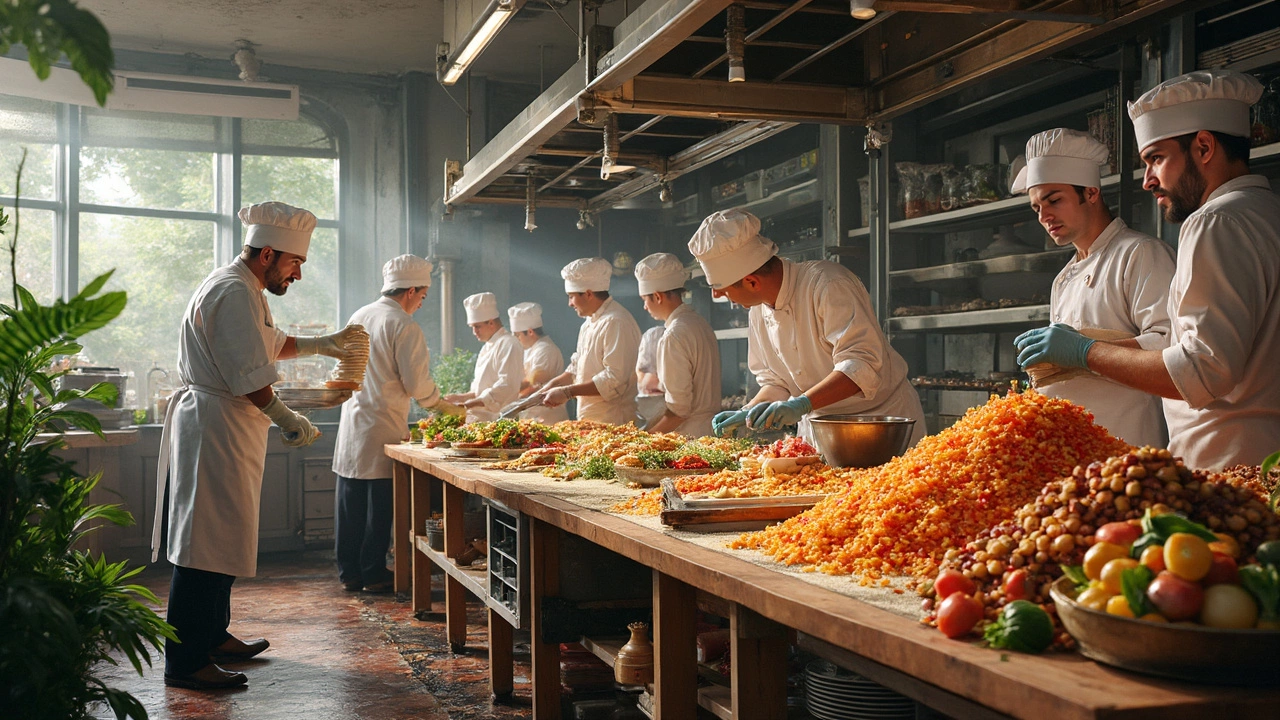All-inclusive hotels are a paradise for food lovers. But ever stopped to think about what happens to all that food when the plates are cleared? It's not just scraped into the trash, believe it or not. Hotels have to deal with leftover food on a massive scale, and there's way more happening behind the scenes than meets the eye.
Let's talk numbers first. These resorts often cater to thousands of guests daily, and that means a lot of food needs to be discarded when the crowds disperse. Surprisingly, many hotels have started adopting innovative measures to minimize food waste. Some are hard at work composting, where food scraps are turned into nutrient-rich soil. Others team up with local farmers and community gardens, sending leftovers their way to feed livestock or nourish crops.
And it doesn't stop at the hotel gates. Many all-inclusives are donating excess edible food to charities, helping feed those in need and supporting local communities. And guess what? Guests can play a part too! Simple actions like taking only what you'll eat, or opting for smaller portions can go a long way in reducing waste.
- The Magnitude of Food Waste
- Innovative Recycling Methods
- Supporting Local Communities
- Tips for Guests to Reduce Waste
The Magnitude of Food Waste
The scale of food waste at all-inclusive hotels might surprise you. Buffets are designed to make sure that there's something for everyone, so a lot of food ends up unconsumed. Globally, it's estimated that about a third of all food produced goes to waste, and hotels contribute a significant chunk to this statistic. In the hospitality industry alone, an estimated 13 billion pounds of food is wasted annually. That’s a big number, right?
Let's break it down a bit. An average hotel can waste up to 2000 pounds of food every week. Much of this waste comes from overproduction in event catering, where planners often prepare more food than necessary to avoid running out. Add in buffet settings where guests might overfill their plates, and it quickly adds up.
Where Does All the Waste Go?
Traditionally, the garbage bin has been the unfortunate destination for most of this leftover food. But times are changing. Many hotels are now taking action, aiming to reduce their carbon footprint by dealing smartly with food waste. They're not just doing it for the environment—cutting down on waste can also save a lot of money. Less waste means fewer disposal costs and lower food purchases.
In 2018, a study by a sustainable hotel group revealed that reducing food waste by just 10% could save an average hotel up to $15,000 annually. Hotels are beginning to see both ethical and economic sense in minimizing waste.
| Statistics | Figures |
|---|---|
| Global Food Waste in Hotels Annually | 13 billion pounds |
| Annual Saving by Reducing Waste by 10% | $15,000 |
Reducing food waste isn't just about money, of course. It's about being sustainable and showing that the hotel cares about the planet. As more guests value eco-friendly options, hotels that emphasize sustainability might just get the edge in booking. And that's a win-win, don’t you think?
Innovative Recycling Methods
All-inclusive hotels are stepping up their game when it comes to managing food waste. You might be surprised by the thought and technology going into these efforts. Let's take a look at some of the creative ways they're recycling leftovers and why it's a win-win for everyone involved.
Composting: Turning Trash into Treasure
One of the most popular methods is composting. It's a process where organic waste, like food scraps, gets broken down into nutrient-rich soil. Many all-inclusive hotels are setting up compost systems that transform leftovers into something valuable for gardens and farms. This not only reduces the waste sent to landfills but also supports eco-friendly practices.
Feeding Our Fuzzy Friends
Believe it or not, leftover food is a feast for livestock too. Some hotels collaborate with nearby farms, where the food that can't be served to humans gets turned into feed for animals. It's a sustainable way to make sure nothing goes to waste and our animal buddies get a tasty treat out of it.
Biogas Plants: Powering with Potatoes
In some cutting-edge resorts, the kitchen scraps don't just go to compost or animals; they actually help power the hotel. Through biogas technology, decomposing food waste produces methane, which can be used to generate electricity or heat water. It's turning a waste problem into an energy solution!
| Method | Benefit |
|---|---|
| Composting | Creates soil, less waste in landfills |
| Animal Feed | Supports local farms, reduces waste |
| Biogas | Generates energy, reduces carbon footprint |
These methods are about more than just reducing waste. They showcase how resorts are innovating to create a more sustainable future. So next time you're at an all-inclusive hotel, you can feel a little better knowing they're working hard behind the scenes to make our planet greener.

Supporting Local Communities
All-inclusive hotels aren't just about offering endless buffets and luxurious stays; many are making notable efforts to support local communities through their handling of leftover food.
One way they do this is by partnering with local charities and food banks. Instead of discarding food that's still perfectly good to eat, these hotels donate it to those in need. This not only helps reduce food waste but also directly supports community welfare. For instance, there's a well-known chain in the Caribbean that has worked with Feeding Our Future to share excess food.
Making a Difference with Food Donations
When it comes to donating food, safety and logistics are key. Many all-inclusive hotels are committed to ensuring the highest safety standards by employing specialists to ensure that donated food is handled properly. This means the food that reaches local shelters and food banks is as safe and nutritious as anything served in the hotel dining area.
Reducing Waste through Creativity
Some hotels add a creative twist by engaging with local startups that are equally passionate about sustainability. In destinations like Mexico, certain hotels team up with entrepreneurs who transform leftover ingredients into products like soaps or compost, which can improve local agriculture.
These initiatives not only mitigate the environmental impact of food waste but also strengthen community bonds, turning a problem into an opportunity for positive change.
| Hotel Location | Donation Partner |
|---|---|
| Caribbean | Feeding Our Future |
| Mexico | Local Startups |
So, next time you're enjoying your stay, remember there's a lot more going on behind the scenes, and your choice of accommodation might just be contributing to something bigger.
Tips for Guests to Reduce Waste
When enjoying the delights of an all-inclusive hotel, it's easy to pile your plate high and then some. But here's the thing—it helps everyone when guests consciously work to reduce food waste. Here's how you can play a part during your stay.
Be Mindful of Portions
It's tempting to load up on that luscious buffet, but start with smaller portions. You can always go back for seconds. This way, you get to savor your food without leaving heaps on your plate.
Make Conscious Choices
Stick to dishes you’re sure you want to eat. Being adventurous is part of the fun, but only take a taste if you're uncertain about a dish. This reduces the chances of tossing untouched food.
Engage in Conversations
Did you know that chatting up the chef or hotel staff can be enlightening? Ask them about the menu or if there are specialty items available. Their insights can guide your choices, so you don't bite off more than you can chew.
Use Reusable Containers
If the hotel allows it, use a reusable container for snacks you might want to enjoy later instead of wasting that extra sandwich you took but didn't eat.
Table of Tips
| Tip | Benefit |
|---|---|
| Small Portions | Reduces uneaten leftovers |
| Conscious Choices | Avoids unwanted waste |
| Engage with Staff | Informs better decision-making |
| Use Reusables | Saves extra food from wastage |
By following these steps, you're contributing to a more sustainable environment while still indulging in the perks of all-inclusive stays. It's a win-win for guests and the planet!
